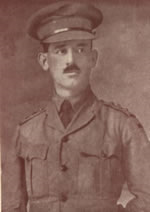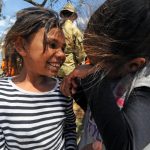First Ashore – Queensland’s own citizen soldier who made history


It is just before dawn on the 25 April, 1915 (it was a Sunday), a few miles off the Gallipoli Peninsular one of the most famous pages in Australian history is about to be written in blood. Every Australian has heard the legend of ANZAC, fewer people know that it was a young man from 9 RQR who would be the first to leap into that page of history. His name was Duncan Chapman.
Duncan Chapman is widely accepted to have been the first man to step ashore at ANZAC cove. Leading the soldiers of the 9th Battalion out of the longboats and motor launches that had carried them from the steaming British battle ships that were pounding the Turkish defences on shore.
Chapman spent most of his time in uniform in the fighting 9th. After being the first Australian ashore at Gallipoli he fought on there until close to the end of the campaign, seeing many of his soldiers and mates interred forever in the sandy soil of the Dardanelles. In one of the plentiful tragedies of that war Chapman survived the campaign only to be killed the following year on the western front.
Chapman is reputed to have been born in Maryborough. What is known for certain is that he listed his family as living in the family home in Bundaberg at the time of his enlistment. His father, Robert, lived in Wangarra street West Bundaberg (street number unknown).
What is known for sure is that Chapman lived in Whytecliffe Street, Albion, a small street that today is mostly low rise apartments. Before he joined the army Chapman was a 26 year old paymaster (today he would probably be called an office manager or admin officer) who had been working in Brisbane for some time when war broke out in 1914. AWM records indicate he enlisted in Brisbane along with most of the soldiers who would serve under his command on 21 Aug.
Records indicate that most of the soldiers in Bravo and Charlie Companies were from Kelvin Grove, Fortitude Valley, South Brisbane and the Gabba. What may surprise many readers is their civilian employment. Records indicate that there were tradies, teachers, even a few bum students from the ‘new’ University of Queensland – not so different from today. The Bn would only be in camp for four weeks (how long does a new member of 9 RQR spend at Kapooka these days?) before embarking the SS Omrah on 21 September 1914, destination Egypt.
One fact that cannot be disputed is that LT Duncan Chapman, late of the 9th Battalion, first Australian Ashore at Gallipoli was a Charlie Company man.
Duncan Chapman was one of two Lieutenants in Charlie Company. He was the younger one (the other, Harry Ker was 34) but was granted seniority (he signed up days before Ker). The Officer in Command of Charlie Company, Captain John Ryder, (in WW1 most rifle companies were commanded by Captains) was younger than them both. Not only was he the youngest officer but he was a lowly uni student living in West End at the time enlisting on the same day at the same recruiting office as Chapman.
Of the three officers only the OC, Ryder made it home. Ker (sic) DOW* about 10 weeks into the landing.
Towards the end of the campaign Chapman would be promoted to Captain. A new battalion was being raised and, just like today, the first place the Army turned when it needed a tough job done was the 9th Battalion. A year after he landed at Gallipoli and little more than a year and a half since enlisting Duncan Chapman would assume command of a company in the 45th Battalion. Only months later Chapman would join so many other Queenslanders on eternal piquet in the mud of the western front. Below is a photo of Duncan Chapman. If you look beyond the sepia tones and the quaint moustache we can recognise a very familiar person – a 26 year old from Albion, who worked in an office in the city, joined the Army with his mates but who went on to help create a legend. Every member of 9 RQR can be proud of this ordinary Queenslander who was a part of extraordinary events. If he were alive today he would be equally as proud of his old battalion.
*DOW Died of Wounds
Leave A Reply
You must be logged in to post a comment.



Comments
Well done for writing such an informative and poignant story of LT Duncan Chapman – long time since I was one of the many Battalion Second in Commands: indeed my father was the first Adjutant of 9 Moreton in 1949 when it was re-raised – appreciated the story and the local focus.
The Battalion seems to be in great hands – the torch is bright and carried high with elan – well done.
David, Thanks for your comment. The 9th is a great community, and in fact is “hard wired” into Queensland itself. Our first CO was a future Premier. The Bn is still in great shape, but I attribute this first and foremost to the quality of the young men (and now women) who volunteer to serve with the fighting ninth. I actually wrote this a couple of years ago for “Action 9” and thought I would repost it here. I still have an itch to write something more comprehensive on the Bn, not so much its war history, but to explore those citizen soldiers (such as your father – being the first ADJT is a gem) who went on to do great things on civilian street. Thanks again for reading,
Regards,
Andrew